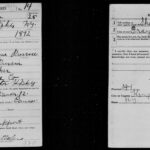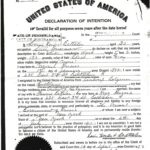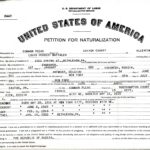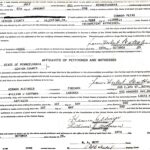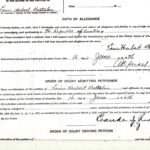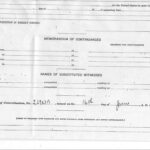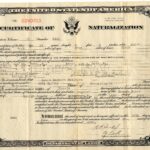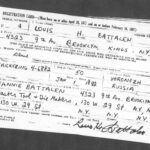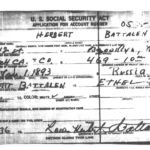From “Paper Life,” by Louise Goldstein. Links will take you to primary documents.
Immigration
Seven of the eight Battalen children immigrated to the United States. The information below is taken from Declarations of Intention, Petitions for Naturalization, World War I and II Draft Registrations and Social Security documents.
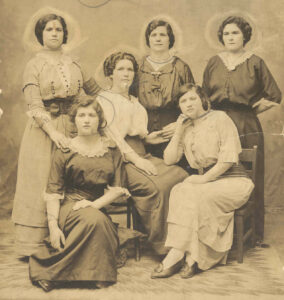
Chaika (Chaie, aka Ida) was the first of the children to leave. When she was 20 years old her last place of residence in Russia was Gomel. She sailed from Liverpool on September 6, 1904 on the SS Aurania , arriving on September 14 at Ellis Island. Listed in the ship manifest as a “tailor” born in Bichov, Russia, her nationality was given as Austrian, and she was going to join her “cousin” Elias Passoff, in care of someone named “Lefow (sic)” at 133 Avenue C, New York City; presumably this was a friend or relative of Elias’. She was detained for a day on Ellis Island, where she and Elias were married the following day. Elias himself had sailed from Rotterdam to New York on the SS Amsterdam, under the name of Schoel (possibly Sha’ul, Saul) Gotthelf. He was born in Gomel on July 10, 1884, and arrived on January 21, 1904. He was naturalized on October 1 1931 and died on April 23, 1939; Chaika was a widow by the time she petitioned for naturalization.
Why did Elias sail under a different name? Many young men purchased fake identity papers, often those of still-living people, in order to avoid the Russian draft. Many kept their assumed names, and there are numerous stories of deathbed confessions decades later. Perhaps Elias purchased fake papers but after arriving, returned to his name. Passoff 1910 US Census Korb 1940 US Census
The next to emigrate, four years later, was Raichel, also as a twenty-year old. She was listed as having been born in Propolsk, Russia. She sailed on the SS Main from Bremen on March 7, 1908, arriving in Boston on March 21. She was on her way to be with her “cousin” Sam Ginsberg (we’ll see other such “cousins”) who lived at 486 Chambers Street, Boston, MA and had paid her passage. Her last place of residence in Russia was also listed as Propolsk, and her closest relative in Russia, her father Chaim, was listed in Voronezh, on Moscovskaya St.
Chasha (Gussie) Boroff arrived next, with her husband Sam and daughter Mary (b. 1903) and son Murray (b. 1909). They left from Libau, Russia on July 10, 1910 on the SS Birma (probably Libau was their last place of residence), and arrived in Boston on July 20. Sam was a wood carver, born on March 25, 1879 in Grodno, Russia. Chasha was listed as 39 at the time; we don’t know where in Russia she was born. Another son, Israel (later known as Al), was born in Boston in 1912. They initially lived at 334 Charles Street, in Boston. Sam was naturalized (see also) on December 5, 1916. Boroff WWI Draft Registration World War II Draft Registration Boroff 1940 US Census
Lev was the next to go, sailing out of Antwerp, according to his Certificate of Arrival, on the Red Star Line’s SS Gothland on June 24th, 1911 and arriving at Ellis Island on July 5; he was 19 or 20 years old. He was going to his brother-in-law Elias Passoff in New York. Lev (Louis) Battalen was born on January 1, 1892 or ‘93, to Haim (aka Yefim), Battalen and Ettel Woloff. He was naturalized in Allentown, PA in June 16, 1926.
Battalen 1920 US Census Battalen 1930 US Census Battalen 1940 US Census
There’s a one in 365 chance that his birthday was really January 1. My mother Ethel said he was born on “new year’s day,” which could have meant January 1, or could have meant Rosh Hashanah – there are many references to Jewish holidays in the letters and the writers seemed to mark time by the holidays.
1913 was a big year for the emigration of the Batalin girls, with two more leaving. Louis’ fiancée Fenya also arrived in 1913.
Soreh was 18 when she left, her passage paid by Louis. She was on her way to be with her brother, “Leib Batalin.” She sailed out of Antwerp on the SS Lapland, leaving on March 22, 1913 and arriving in New York on April 2, just a couple of weeks before Fenya Ronen arrived. Born in Vitebsk, she listed her closest relative in Russia as her father Chaim Batalin, with his address given as Vitebsk (the painter Marc Chagall was born in Vitebsk). Like her sisters before her, her occupation was listed as “seamstress.” Because Abe declared his intent to naturalize and petitioned for naturalization before 1926, his wife Sore was received her US citizenship through him. Abe also registered for the World War I draft. Schwartz 1920 US Census Schwartz 1940 US Census
The next in this long, sad list of departures was Rose, married at the time to Ruben Chernack. Her last residence in Russia was in Vitebsk; at the age of 23 she sailed with Ruben and their son Boroch (aka Ben), age 1, on the SS Menominee (see also part two of the ship manifest), landing on August 5, 1913. They were going to Sam Ginsberg, 112 Hampden Street in Roxbury, Massachusetts. In the 1920 US Federal Census her parents are recorded as speaking Polish and having been born in Moscow. At the time of the census, the Chernak’s lived at 41 Fernboro Street, Boston, MA. Ruben was naturalized on June 19, 1944 when they lived at 2 Carlisle Street in Roxbury. The HIAS (the Hebrew Immigrant Aid Society resettled immigrants and refugees and still does) immigration records list her name as Rive (“Riva”). Like the other men, Ruben registered for the World War II draft. Chernak 1920 US Census
The youngest sister, Fannie (probably known as Feige in Russia, based on how she’s listed in her ship manifest (see also page two) was the last to emigrate. She arrived in New York on the SS Celtic, which sailed from Liverpool on July 9, 1914 and arrived in New York ten days later, on the 19th. She is listed as being 18 years old, a seamstress. Both her birthplace and her last residence are listed as Vitebsk and like Rose, her father Chaim is also listed as residing in Vitebsk. She is heading to Roxbury and her brother-in-law Sam Ginsberg paid her fare. Fannie petitioned for naturalization and was naturalized on May 17, 1943; she was living at 2 Carlisle Street in Roxbury at the time.
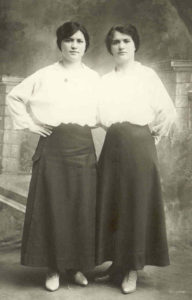
Her future husband Boris Schulman sailed from Le Havre on August 23, 1912 on La Lorraine and arrived in New York on September 2. On November 15, 1916 when he declared his intent to naturalize, he was living on 530 Wood Street in Flint, Michigan. We know from Boris that he worked for General Motors in Flint, making wooden wheels for automobiles.
His name is listed as “Borek,” which is a Polish first name that was sometimes used by Jews as a more Polish-sounding name than Baruch. He petitioned for naturalization on July 28, 1923, when he was living on Fernboro Street in Roxbury; son Joey had been born by then. In the naturalization document he petitions to have his name changed to “Borris.” Schulman 1920 US Census Schulman 1940 US Census
Lev & Fena’s Immigration Plans
As early as the end of 1910, Lev was discussing emigration plans for both himself and Fenya and the plans already include his family members:
Lev to Fenya
“Earlier I thought that we’ll go together but I made up my mind, as I want you to arrive when everything is ready for you. You will be traveling with my two sisters, and I, by that time, will try to make our life. Then, I presume, your parents won’t object.”[1]
And a bit later:
It is my duty Fenichka, to supply you with everything you would need, from Kiev and till the end of the trip – America. And you would not go by yourself, but with my two or even three sisters, who agreed to wait for you. Though they do not know you, they love you, trusting in my choice.[2]
The emigration plans of other sisters are discussed:
This Borovskaya is my older sister who is going to America this summer [1910]. Her husband already left and is doing pretty well for himself…[3]
Lev received his first Shifscard in January, 1911[4], but there was a problem with the border to be crossed, so he received another on March 26.[5]
During the two years that Louis was in the US before Fenya arrived, there was quite a bit of discussion between the two of them regarding why Louis has not yet sent for her. Usually it was because Lev had to bring a sister over or his parents needed money.
Louis to Fenya
…because they [the parents] were given [compelled] to leave Voronezh. They had to leave on short notice. In a word, they went broke, but I happened to be making good money then. I sent them 50 dollars… so it turns out that I satisfied one side and offended the other. Whatever can I do?[6]
Why were they “…given to leave Voronezh…on short notice…?” Jews were routinely ordered out of their places of residence. For example, there is evidence of an apparent expulsion from Voronezh in 1909-1910 (before Lev emigrated) in the “List of Events in 5670 and Necrology (1909-1910)” of the American Jewish Committee’s American Jewish Year Book and one can assume that this is the sort of thing that happened to the family:
December 24. New Minister of Commerce receives numerous petitions from Russian peasants, merchants, and exchange committees on behalf of exiled Jews…M. Niselovitch requests Government to inquire into unjust banishment of Jews from Voronezh…where Jews were permitted to reside by Imperial Order. Request refused.
October 29. One hundred Jewish artisans and their families expelled from Voronezh.
March 11. Reported that deputations are expected in St. Petersburg from Kieff [sic], Riga, etc., to lodge appeal on behalf of a hundred Jewish families who are being expelled…Stated that…38 families numbering 120 persons being expelled from town and province of Voronezh…
March 22. …expulsion of Jews from various cities in Russia reaches magnitude never attained before. Hundreds of families living for years in Kieff, Riga, Kasan, and Voronezh, driven out.[7]
He helps one of his sisters, probably Sore (Sarah), leave Russia after she pays his fine for dodging the draft; she was the next to leave after Lev, in 1913:
Louis to Fenya
… I sent for my sister since she had to pay a 300 ruble fine for me so that it was impossible for her to stay there any longer. And just as soon as she arrives I will immediately send…for you because I want to finish with this long separation.[8]
Fenichka what would you do if you got a letter that said your sister was in danger? And I, realizing that I am the only one who is responsible for that…How could I behave?[9]
After Lev left, the remaining sisters’ last places of residence are all listed on their ships’ manifests as Vitebsk; perhaps the parents moved there after being forced out of Voronezh, and perhaps they went there as their daughter Rose was living there.
[1] Lev to Fenya, Voronezh, December 23, 1910
[2] Lev to Fenya, Voronezh, January 17, 1911
[3] Lev to Fenya, Voronezh, Sister’s Address, undated
[4] Lev to Fenya, Voronezh, January 17, 1911
[5] Lev to Fenya, Voronezh, March 28
[6] Louis to Fenya, New York, January 8
[7] www.ajcarchives.org/ajc_data/files/1910_1911_4_yearreview.pdf AMERICAN JEWISH YEAR BOOK
[8] Louis to Fenya, New York, Nov 4 1912, Election tomorrow
[9] Louis to Fenya, New York, Sister was in danger, December 12, 1912
